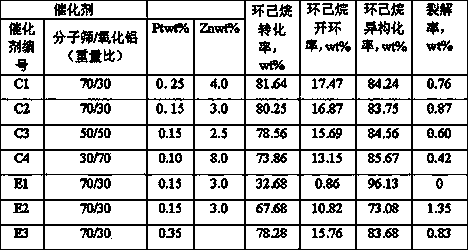Hydrogenation catalyst for naphthenic hydrocarbon and preparation method and application thereof
A catalyst and cycloalkane technology, which is applied in the direction of molecular sieve catalysts, chemical instruments and methods, physical/chemical process catalysts, etc., can solve the problems of low cracking rate, reduced platinum content of active components, etc., and achieve cyclohexane isomerization rate Low, activity improvement, and the effect of reducing production cost
- Summary
- Abstract
- Description
- Claims
- Application Information
AI Technical Summary
Problems solved by technology
Method used
Image
Examples
Embodiment 1
[0030] (1) Synthesis of Y-Beta composite molecular sieve
[0031] In the first step, 12.5g of Y molecular sieve was added to 0.65g of sodium hydroxide, 10.8g of TEABr (tetraethyl amine bromide), and 4.0mL of concentrated ammonia (25% by weight) solution, stirred for 0.5 hours and mixed well.
[0032] In the second step, 10.0mL silica sol (SiO 2 30% by weight) and 41 mL of distilled water were added to the above solution and stirred for 1 hour.
[0033] In the third step, the white gel was put into a 150mL stainless steel reactor, crystallized at 140°C for 90 hours, and taken out, washed until the solution was neutral and dried. The prepared sample was calcined at 550°C for 4h to remove the template. Get Y-Beta composite zeolite molecular sieve.
[0034] (2) Treatment of Y-Beta composite molecular sieve
[0035] Take 200 grams of Y-Beta composite molecular sieve prepared in step (1), and exchange them with 400 grams of ammonium nitrate solution with a mass concentration of 50% at 80°C ...
Embodiment 2
[0039] The preparation method of catalyst C2 is the same as that of Example 1, except that the metal Zn and Pt are co-impregnated, and the content of Zn is different. The catalyst composition and evaluation results are shown in Table 1.
Embodiment 3
[0041] Take 50 grams of the hydrogen-type Y-Beta composite molecular sieve prepared in Example 1, 69 grams of SB powder, and 2.50 grams of Sesbania powder, mix well, then add 60mL deionized water and 2.50mL concentrated nitric acid (66.5w%) on the roller compactor Fully kneading to make it into a paste-like plastic, extrude a cylindrical strip with a diameter of 1.5mm on an extruder, dry at 110°C for 8 hours, and then calcinate in an air atmosphere at 550°C for 4 hours to obtain a catalyst carrier D2; take an appropriate amount of carrier D2, Impregnated with a solution containing Zn and Pt, dried at 110°C for 6 hours, and calcined at 500°C in an air atmosphere for 4 hours to obtain catalyst C3. The catalyst composition and evaluation results are shown in Table 1.
PUM
| Property | Measurement | Unit |
|---|---|---|
| Specific surface area | aaaaa | aaaaa |
| Pore volume | aaaaa | aaaaa |
Abstract
Description
Claims
Application Information
 Login to View More
Login to View More - Generate Ideas
- Intellectual Property
- Life Sciences
- Materials
- Tech Scout
- Unparalleled Data Quality
- Higher Quality Content
- 60% Fewer Hallucinations
Browse by: Latest US Patents, China's latest patents, Technical Efficacy Thesaurus, Application Domain, Technology Topic, Popular Technical Reports.
© 2025 PatSnap. All rights reserved.Legal|Privacy policy|Modern Slavery Act Transparency Statement|Sitemap|About US| Contact US: help@patsnap.com

